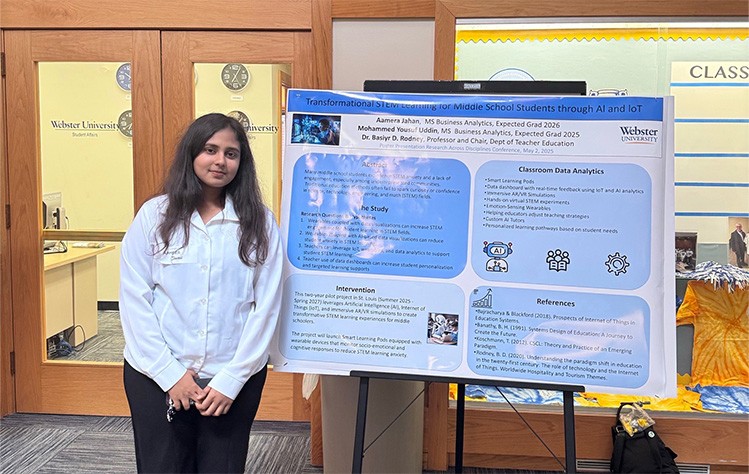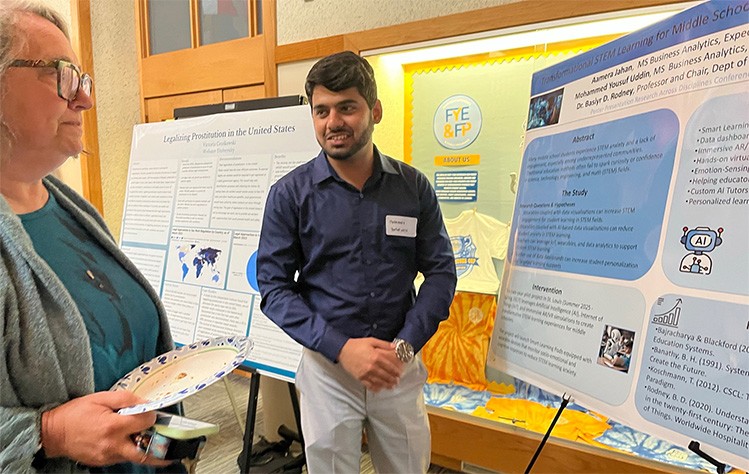Transforming STEM Learning With AI: A Collaborative Effort
May 21, 2025
 Aamera Jahan with the research project poster at the Research Across Disciplines conference
on May 12, 2025
Aamera Jahan with the research project poster at the Research Across Disciplines conference
on May 12, 2025
In today’s rapidly evolving educational landscape, innovative collaborations are essential.
One such initiative is the partnership between Dr. Basiyr Rodney, a professor in the
School of Education, and two Master of Science in Business Analytics students, Aamera
Jahan and Mohammed Yousufuddin. Together, they aim to transform STEM learning for
middle school students through the use of artificial intelligence technologies.
Rodney’s expertise in education and his vision for integrating technology into teaching
provide a strong foundation for the project. His mentorship guides Jahan and Yousufuddin
as they apply their analytical skills to real-world educational challenges. The team’s
goal is to develop Smart Learning Pods equipped with wearable devices that monitor
students’ socio-emotional and cognitive responses — reducing anxiety and enhancing
engagement in STEM subjects.
Student Perspectives: Aamera Jahan and Mohammed Yousufuddin
Jahan brings a unique perspective to the project. With three years of experience in
customer relationship management in India, she chose Webster University’s Business
Analytics program for its emphasis on practical application and interdisciplinary
learning. “My selection of Webster’s Business Analytics program is attributable to
its emphasis on practical application, interdisciplinary learning and data-informed
analytics,” she said.
The curriculum’s focus on statistical computing, machine learning and business problem-solving
aligns with her career aspirations. “Courses like predictive analytics, data visualization
and applied business statistics are especially valuable in preparing me for the demands
of a strategy consulting role,” she said.
Working with Dr. Rodney has been a transformative experience for Jahan. She has applied
analytics to real-world problems in STEM education, explored the impact of AI and
the Internet of Things, and contributed to meaningful research that connects data
with social change. “His mentorship also helped me strengthen my critical thinking
and collaborative skills,” she said.
 Mohammed Yousufuddin explains the professor and student collaboration to a faculty
member.
Mohammed Yousufuddin explains the professor and student collaboration to a faculty
member.
Yousufuddin, also pursuing a master’s in Business Analytics, brings a background in talent acquisition and a passion for social impact. He chose Webster’s program for its balance of technical proficiency and strategic thinking, as well as its global learning environment. “The curriculum is geared to provide students with the skills they need to tackle actual business issues,” he said, noting the value of real-world case studies and faculty with industry experience.
Yousufuddin’s long-term goal is to become a leader at the intersection of social impact, education technology and data science. “I want to use analytics and AI to propel innovation in STEM education and increase learning’s impact, equity and personalization,” he said. To achieve this, he plans to combine academic learning with hands-on projects, internships and continuous engagement with emerging technologies.
His collaboration with Dr. Rodney has been one of the most rewarding experiences of his academic journey. “I was challenged to think critically, relate data insights to learning objectives and tackle issues from both a technical and human-centered standpoint,” he said. “It reaffirmed my enthusiasm for leveraging statistics to promote constructive change in educational settings.”
At the recent Research Across Disciplines (RAD) Conference, Yousufuddin was inspired by the diversity of projects and the interdisciplinary nature of analytics. “It was an inspiring experience that demonstrated how applicable everything we’re learning is in the real world,” he said.
Impact of AI Tools on Learning
AI tools are reshaping education by moving beyond the traditional one-size-fits-all approach. These technologies enhance critical and transformative thinking by automating tasks such as memorization, administration and evaluation — freeing educators to focus on meaningful student interactions.
The result is a shift toward personalized, data-driven learning experiences that promise significant advancements in teaching and learning practices.
By integrating these AI tools into educational settings, Rodney and his team are setting a new standard for STEM learning — making it more engaging, personalized and effective for middle school students.
Webster’s Graduate Certificate in AI-Assisted Learning and Instruction program is
now accepting applications for Fall 2025. To learn more, please contact Admissions
Officer Natasha McCallister or visit AI-Assisted Learning and Instruction.

